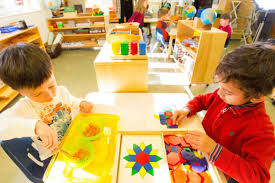The Benefits of Montessori Education
Welcome to our comprehensive guide on the benefits of Montessori education. In this article, we will explore the numerous advantages of this educational approach and how it can positively impact your child’s development.
Individualized Learning
One of the key benefits of Montessori education is its focus on individualized learning. Unlike traditional educational systems, Montessori classrooms encourage personalized learning experiences tailored to each student’s unique needs and interests. This approach allows children to progress at their own pace, fostering a deep sense of self-confidence and motivation.
Hands-on Learning
Montessori education emphasizes hands-on learning experiences. Through the use of specially designed materials and activities, children engage in active exploration and discovery. This experiential learning approach not only enhances their understanding of various subjects but also promotes critical thinking, problem-solving, and creativity.
Self-Directed Learning
In Montessori classrooms, children are encouraged to take ownership of their learning journey. They have the freedom to choose their activities within a structured environment, allowing them to develop decision-making skills and a sense of responsibility. This self-directed learning fosters independence and a lifelong love for learning.
Multi-Age Classrooms
Another unique aspect of Montessori education is the presence of multi-age classrooms. Instead of segregating students by strict age groups, Montessori classrooms often have a mix of ages, typically spanning three years. This setup promotes collaboration, peer mentoring, and social development. Younger students learn from older ones, while older students reinforce their knowledge by teaching younger peers.
Respect for Individual Differences
Montessori education places a strong emphasis on respecting and celebrating individual differences. The diverse needs, interests, and learning styles of each child are acknowledged and valued. This inclusive environment fosters a sense of belonging, empathy, and appreciation for diversity.
Focus on Practical Life Skills
Montessori education recognizes the importance of practical life skills in a child’s overall development. From daily tasks such as cleaning, cooking, and gardening to learning essential social skills like communication and problem-solving, Montessori classrooms provide a holistic approach to education. These practical life skills not only benefit children academically but also prepare them for real-world challenges.
Strong Foundation in Academics
While Montessori education focuses on holistic development, it also ensures a strong foundation in academics. The carefully designed curriculum covers various subjects, including language, mathematics, science, geography, and cultural studies. Montessori materials and activities are designed to make abstract concepts tangible and accessible, laying the groundwork for future academic success.
Development of Social and Emotional Skills
Montessori education recognizes the importance of social and emotional development alongside academic growth. Through collaborative projects, group activities, and conflict-resolution exercises, children learn essential social skills such as communication, empathy, and teamwork. They also develop emotional intelligence, self-awareness, and resilience, which are crucial for their overall well-being.

Montessori education offers a unique and effective approach to learning that focuses on individualized, hands-on, and self-directed experiences. By promoting independence, practical life skills, social-emotional development, and a strong academic foundation, Montessori education equips children with the skills they need to thrive in the modern world. Consider Montessori education for your child and witness the transformative benefits it can bring to their educational journey.
Frequently Asked Questions
1. What are the benefits of Montessori education?
The benefits of Montessori education include fostering independence, promoting critical thinking skills, encouraging creativity, and developing a love for learning.
2. How does Montessori education promote independence?
Montessori education allows children to choose their activities and work at their own pace, which helps them develop self-confidence, decision-making skills, and a sense of responsibility.
3. Does Montessori education focus on academics?
Yes, Montessori education emphasizes both academic and non-academic development. It provides a well-rounded education that includes language, mathematics, science, cultural studies, and practical life skills.
4. How does Montessori education encourage critical thinking?
Montessori classrooms provide hands-on learning experiences and materials that promote problem-solving, decision-making, and logical reasoning skills, thus fostering critical thinking abilities.
5. Can Montessori education benefit children with special needs?
Yes, Montessori education is known for its individualized approach, which can benefit children with special needs. The materials and activities can be adapted to meet each child’s unique learning requirements.
6. Does Montessori education promote creativity?
Absolutely! Montessori classrooms encourage creativity by providing open-ended materials and activities that allow children to explore, imagine, and express themselves artistically.
7. How does Montessori education develop a love for learning?
Montessori education fosters a natural curiosity in children by providing a prepared environment that stimulates their interests and allows them to pursue their learning paths.
8. Are Montessori-educated children more self-disciplined?
Yes, Montessori education promotes self-discipline by allowing children to take responsibility for their actions and learn from their mistakes in a supportive and respectful environment.
9. Does Montessori education benefit social development?
Absolutely! Montessori classrooms promote social interaction, cooperation, and respect for others. Children learn to work collaboratively, resolve conflicts, and develop empathy and compassion.
10. Can Montessori education benefit children in the long run?
Research suggests that Montessori-educated children often exhibit strong academic, social, and emotional skills, which can benefit them throughout their lives and contribute to their overall success.




